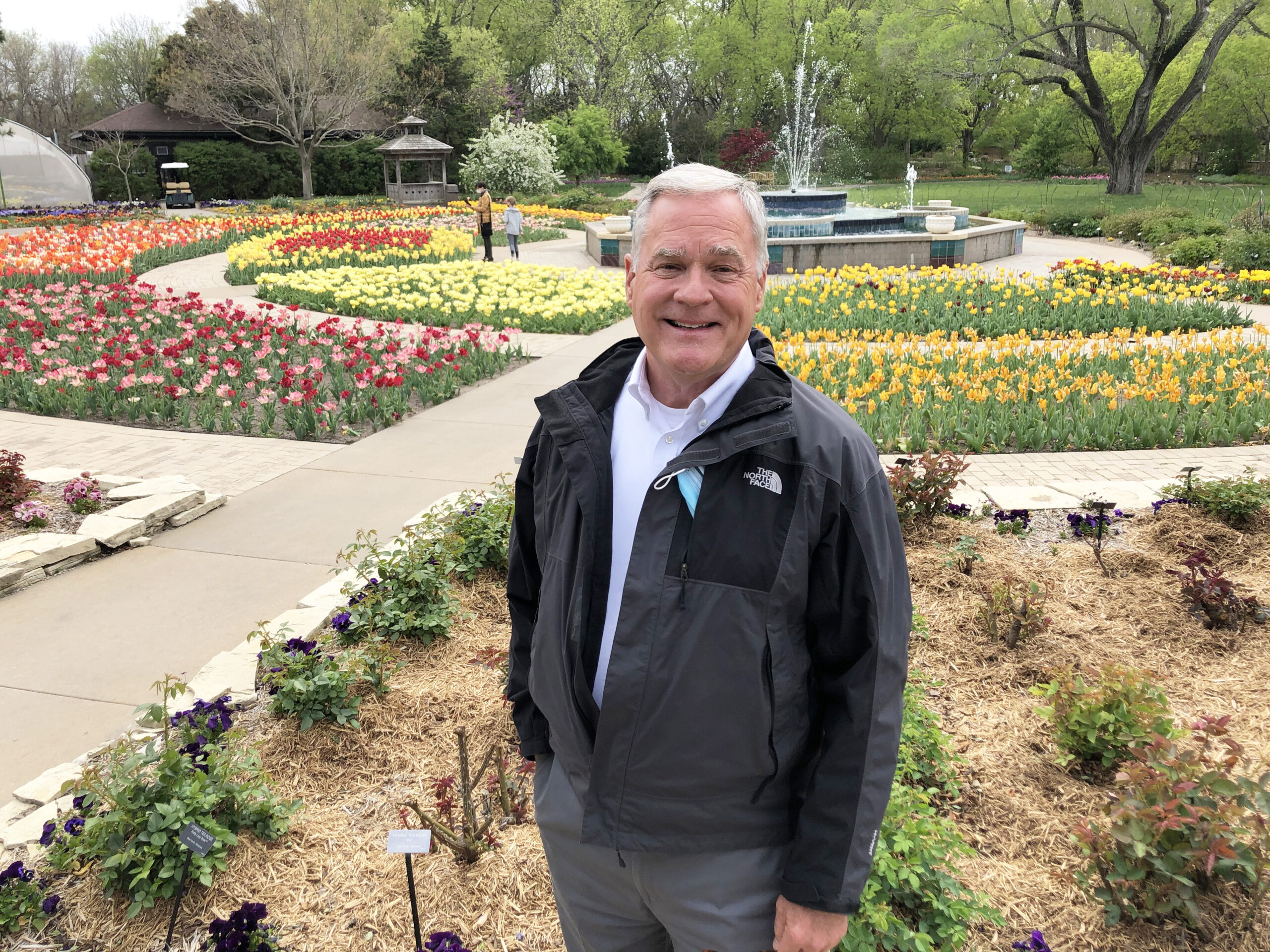Marty Miller was walking near Botanica’s gorgeous new Grand Lawn one afternoon last month when three female visitors ambled across his path.
“Hey, Marty!” one said. “Man, we had no idea all this was going on.”
“We approve!” another added.
-

New troll sculpture doubles as a playground. -

Rainbow-hued arches greet vistors to the Children’s Garden. -

Visitors of all ages enjoy the restored Joyland carousel.
A whole lot has been going on since Miller became executive director of Botanica 13 years ago, from the addition of land, gardens and features such as the Grand Lawn to the growing of membership and revenue-producing events in an attempt to become self-sufficient.
It’s been accomplished while keeping the place’s original focus intact: On the day Miller ran into the visitors, 66,000 tulips turned Botanica into a riot of color.
City Councilman Bryan Frye calls Miller a “driving force” who’s “not afraid of taking on new ideas and challenges.”
“He brings such enthusiasm with every project, it’s nearly impossible to say no to him.”
Leading a nonprofit botanical garden is not something the 71-ytear-old Miller envisioned himself doing. Yet in many ways, his background and career prepared him for it.
Miller is the son of Vern Miller, a legendary figure in Kansas politics and law enforcement. Growing up, Miller said with a smile, “Everything was a competition with my dad, and of course he’d always win.”
Miller’s office seems to serve partly as a surplus storage room for Botanica and partly as a miniature version of Botanica itself. There’s a donated lacquered Chinese desk that would not be amiss in Botanica’s Chinese Garden, toy carousels and trains, drawings of butterflies, audio visual equipment and models of future plans. Staff pop in and out to ask Miller a quick question, pick up or drop off items.
Miller graduated from West High (class of ’68) when his dad was Sedgwick County sheriff. Vern Miller put him to work on the night shift in the jail as an 18-year-old business major at Friends University. “It wasn’t about the money,” Miller said. “He just wanted to know where I was at night.”
At age 20, he became a sheriff’s deputy patrolling the city’s north end, again on the night shift or “third detail.”
He remembers one incident in particular. He was driving north on Broadway when a BOLO went out for a car travelling just in front of him, believed to contain two suspects from an armed robbery. Vern Miller got on the radio, telling his son to wait until he could get there before stopping the car. Marty disobeyed, pulling the car over and bluffing the young suspects inside to give themselves up without trouble.
When Vern arrived, he was at first upset. “Then he saw what was going on and said ‘Good job, son’” — not an everyday occurrence, Miller says.
Vern Miller is now retired and living in Arizona.
After his dad became attorney general, Miller worked as a deputy in Johnson County, where the pay was higher. When Vern Miller was elected district attorney for Sedgwick County — after just missing getting elected governor — Marty went back to work for him in an administrative role. He started grant writing, which brought in money to establish the state’s first pre-trial diversion and victim/witness programs.
Miller then worked for Phil Ruffin for a decade, running the billionaire businessman’s chain of Town and County convenience stores while earning a master’s degree from Friends. He returned to government when Joan Finney, who was governor from 1991-95, appointed him director of community development in the Department of Commerce. He became the state’s “flood czar” after the catastrophic flood of 1993. In that role he helped distribute tens of millions of dollars in federal disaster relief.
Miller moved back to Wichita in 2000 to take a job as grants coordinator with the city, working on projects such as the Kansas Food Bank, Eaton Hotel, Save A Lot at 13th and Grove and restoration of the Orpheum Theatre. One day when he wasn’t exactly loving his job, Miller says, he jokingly asked then-Parks Director Doug Cupper if he had any lawn-mowing jobs open.
“He said, ‘What about running Botanica?’ I said, ‘Where is it?’ I’d never been to a garden — a public garden — in my entire life.”
One visit convinced him that Botanica “could really be a place.” But he doubted whether the organization’s board of directors would hire him. Asked during his job interview to rank himself as a gardener, Miller replied he was “probably a one-and-a-half. My granddad taught me about horse manure.”
More seriously, Miller told the board that Botanica was failing and needed to make money.
“I said if you don’t want change and you don’t want chaos, don’t hire me. I said you need to run Botanica like a business, not a garden.”
Some longtime Botanica members resisted change but Miller remained adamant Botanica needed to attract more visitors through events, rentals and a building program. First on his list was developing a Children’s Garden to bring in young families. Opened in 2011 with a lead donation from the Barry and Paula Downing Foundation, Miller says it’s “still one of the premier children’s gardens in the country.”
Next was the Chinese Garden, opened six years ago thanks to a large donation by Jayne Milburn. Chinese visitors “tell us going through our garden is like being at home,” Miller said.
Events such as Blooms, Brooms & Bloody Mary’s brought in more visitors, and Botanica’s membership grew from about 1,900 to 6,200 before the pandemic.
Botanica’s biggest source of income is Illuminations, the annual holiday-themed light show. Although Illuminations’ roots go back to the early 1990s, its popularity soared after 2012, when the Children’s Garden opened and trees throughout the property were wrapped with LED lights. The next year, 60,000 people visited and in 2019, over 90,000 did so. Even during last year’s pandemic, 78,000 enjoyed the spectacle.
The Grand Lawn is part of a complete remaking of Botanica’s west end. The long sloping green lawn and stage will debut May 14 with a sold-out concert by the Wichita Symphony. Flanking the venue on one side are the restored Joyland amusement park carousel and a huge, grass-covered troll sculpture that doubles as a playground for kids. On the other side is a large covered patio with stone fireplace that can be rented for events. Eventually, Botanica’s public entrance will be shifted to its southern border, to be accessed by Museum Boulevard, which also runs by the Wichita Art Museum and Old Cowtown Museum.
Raising money is an ever-pressing goal for Miller, who says his calendar “goes by dollar signs.” On the day he runs into the three women at the amphitheater, he explains details of the work underway and more that’s planned. He urges them to take off their shoes to trod on the soft artificial turf, then invites them for a complimentary ride on the carousel. When one admires the lamps around the Grand Lawn, Miller quickly interjects: “You can sponsor one of those if you want.”
Another need is volunteers, many of whom did not feel comfortable showing up during the pandemic.
“There are a lot of benefits to volunteering here besides working in such a beautiful place,” he said, mentioning camaraderie, discounts and the Thursday “Weed and Feed” program that includes lunch for volunteers.
Miller and his wife, the former Cynthia Donnell, have a blended family of five children and 11 grandchildren. They grew up across the street from each other. Both her father and grandfather served as Wichita mayors, which may be why she understands Miller’s dedication to Botanica.
“She calls this my mistress,” he said. “Coming over here for a job has turned into a passion.”









